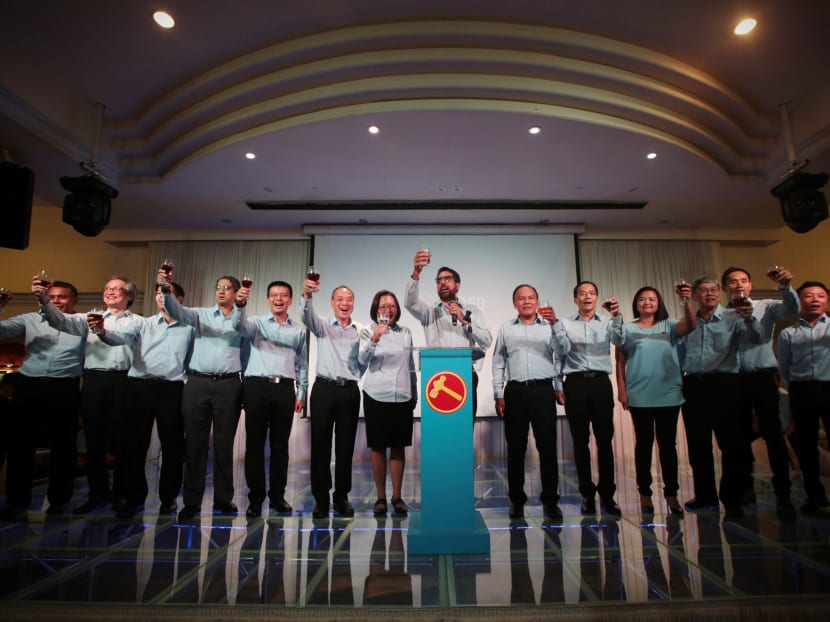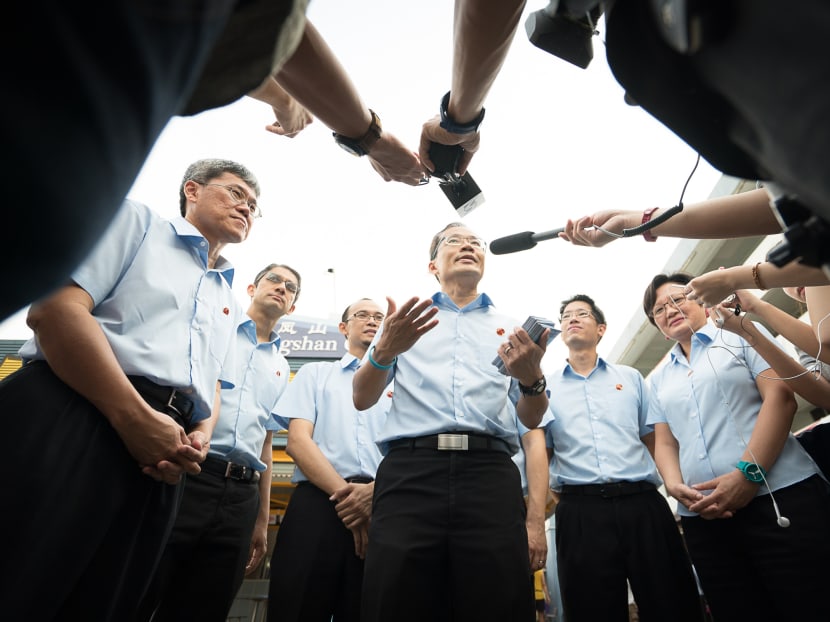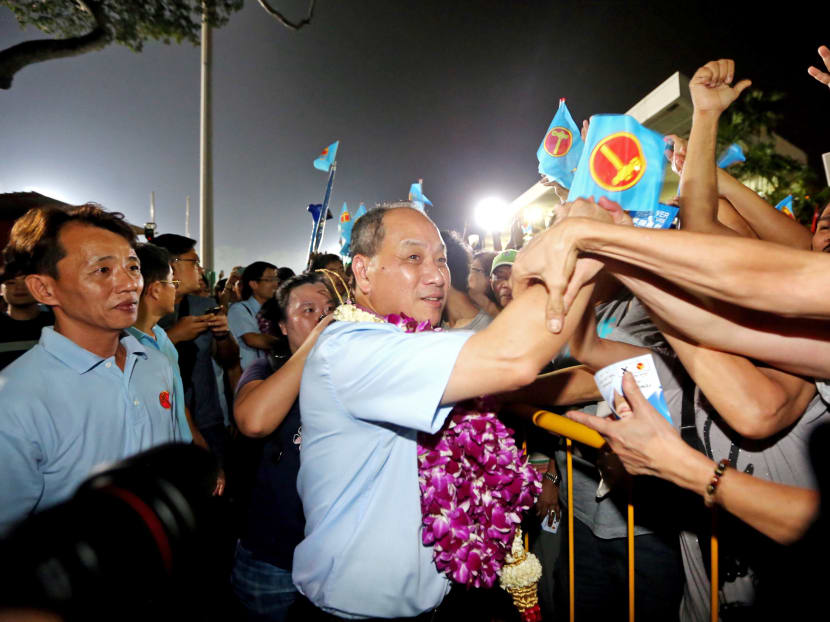The Big Read: Dissecting the Low Thia Khiang bombshell - what’s in store for WP and the Opposition
SINGAPORE — Opposition leader Low Thia Khiang dropped a bombshell last week when he announced that he will be stepping down as Workers’ Party (WP) chief.

Workers Party CEC members offer a toast at the Workers Party 60th Anniversary Dinner on Nov 3, 2017. Photo: Jason Quah/TODAY
SINGAPORE — Opposition leader Low Thia Khiang dropped a bombshell last week when he announced that he will be stepping down as Workers’ Party (WP) chief.
Outside the WP, people were surprised, although the party line was that it had been on the cards for some time.
.embed-container { position: relative; padding-bottom: 56.25%; height: 0; overflow: hidden; max-width: 100%; } .embed-container iframe, .embed-container object, .embed-container embed { position: absolute; top: 0; left: 0; width: 100%; height: 100%; }After all, Mr Low’s departure from the top post, after more than 15 years at the helm, comes at a time when Singapore’s largest opposition party is at a crossroads: Its top leaders, including Mr Low, are embroiled in multi-million-dollar civil lawsuits over financial management lapses at its town council.
Mr Low, party chairman Sylvia Lim and assistant secretary-general Pritam Singh are being sued by Pasir Ris-Punggol Town Council and independent auditors appointed by WP’s Aljunied-Hougang Town Council (AHTC). Celebrating its 60th anniversary this year, the party is also looking to bounce back at the next General Election (GE), following a lacklustre performance in the 2015 GE.
For the opposition fraternity, Mr Low’s stepping down also marks the changing of guard: Along with the late J B Jeyaretnam - whom Mr Low succeeded as WP chief - and Mr Chiam See Tong, Mr Low is widely considered as an iconic Opposition figure in Singapore. Many observers have also credited WP’s rise to Mr Low: Under his leadership, the WP increased its number of parliamentary seats from one to nine, including three Non-Constituency Members of Parliament (NCMPs).
He also led the party to a historic victory in Aljunied in the 2011 GE, making it the first opposition party to win a Group Representation Constituency (GRC).
In a country known for its stable politics, a change in leadership at the second oldest political party in Singapore - behind the ruling People’s Action Party (PAP) which was founded in 1954 - and the passing of an era surely throw up many questions. But beyond the obvious questions of why now and who is next, Mr Low’s decision to step down next year will have some bearing on broader issues, including the WP’s future direction and the shape of things to come in Opposition politics here.
WAS AHTC SAGA A FACTOR?
While leadership renewal has been on Mr Low’s mind for a while, the fact that his announcement came at a time when the WP’s top leaders - including himself - are embroiled in the civil lawsuits has set tongues wagging: Was he trying to wipe the slate clean for the WP in time for the next GE, by bearing the brunt of the potential fallout? Or was he pressured by the party to take responsibility for the problems?
Speaking to reporters at his Meet-the-People session earlier this week, Mr Low gave short shrift to such talk: “(People) can say whatever they like. The fact is that I know what I am doing, I have been doing what I set out to do. And I have reached a point where I think I have done what I could have done, and it is time for me to (step down).”
Former WP NCMP Yee Jenn Jong also chimed in, by voicing his disagreement with the views that Mr Low’s stepping down “has something to do with the impending town council law suit”. “The plan for succession was laid out long ago and implemented in steps,” he said on Facebook.
Given the tight ship run by Mr Low, party members who spoke to TODAY agreed to do so only on condition of anonymity. They felt that the civil lawsuits was a major factor, one way or the other, behind Mr Low’s decision.
“It is very obvious, that the pressure from the legal woes was mounting, and he wants to distance the party from it,” said a party member who declined to be named. Another long-time WP member added that the lawsuits have “drained some of (Mr Low’s) political energy”.
Without referring to the AHTC saga, Mr Low had said the WP had experienced “many challenges…one after another” since 2011, which hindered efforts to have a new chief in place.
Analysts were divided on whether the town council woes were a decisive factor, with Nanyang Technological University political scientist Woo Jun Jie saying that Mr Low’s move showed a “lack of confidence in his own ability to lead (WP) out of the AHTC mess”.
But Singapore Management University law don Eugene Tan argued that Mr Low’s position was secure within the WP despite the legal woes. “His stepping down will hardly affect public perceptions surrounding the AHTC lawsuit… If Mr Singh or Ms Lim is elected secretary-general next year, it can be said that the Mr Low’s stepping down has nothing to do with the lawsuit,” said Assoc Prof Tan.
He felt that the link between the impending change in leadership and the legal tussle has been exaggerated. “(Those who take this view) have not suggested how his stepping down is going to help WP or the lawsuit. It’s too convenient a linkage,” he added.
However, former WP member Eric Tan, 61, noted that by vacating his position, he would “tidy up (the party’s) legacy”. Mr Eric Tan, who led the WP’s East Coast GRC team in the 2011 GE but left the party after he was overlooked for the NCMP post, said he expects Ms Lim to also step down as chairman.
HOW WP’S CORE LEADERSHIP WILL LOOK LIKE
While neither Mr Low nor the party gave anything away on the identity of his successor, observers and party members whom TODAY spoke to said Mr Singh, who has been the assistant secretary-general since June last year, is the frontrunner.
The 41-year-old lawyer joined the party in 2010, and was part of the team that wrested Aljunied GRC from the PAP in 2011.

Mr Singh’s fellow Aljunied GRC MP Chen Show Mao had mounted an unsuccessful leadership challenge - the first time Mr Low faced a contest for the secretary-general post - in the party’s Central Executive Council (CEC) election last year. However, party members said they do not expect another challenge from Mr Chen or anyone else when the cadres elect their officebearers next year. This would pave the way for a smooth leadership transition, they noted.
Apart from Mr Singh, the three Non-Constituency MPs — shipping lawyer Dennis Tan, research consultancy director Leon Perera, 46, and sociologist Daniel Goh, 44 - are expected to play key roles in the WP’s next generation leadership.
Party members singled out Mr Dennis Tan, who is thought of highly by Mr Low, as one to watch. The 47-year-old started volunteering with the WP in 2011, and contested the single seat ward in Fengshan four years later. Currently sitting on the WP CEC as its treasurer, Mr Dennis Tan is understood to be helping out Hougang MP Png Eng Huat, 55, at his Meet-the-People sessions.
Hougang used to be Mr Low’s stronghold, until he moved out in the 2011 GE to lead the WP team in Aljunied GRC. “Some (members) speculate that Dennis will be chairman taking over from Sylvia... After all, Pritam, Dennis and Leon have a good working relationship,” said a party member, who is in his 60s.

NEW LEADER, BUT ‘SAME OLD STYLE’
Whoever becomes the new WP chief, observers and party members said the party is likely to continue in the same vein - for the simple reason that Mr Low is expected to continue pulling the strings and exerting a strong influence.
“I don’t expect the vision of the new leadership to be radically different even if the political posture (becomes) more combative and aggressive,” said Assoc Prof Tan.
One of the WP members added: “He will be like the ‘senior minister’, (exercising influence) in the background unless the younger leadership decides they want to be on their own.”
SIM Global Education associate lecturer Felix Tan said Mr Low’s years of experience in the political realm would prove “invaluable” to the party.
“Although Mr Low’s role may be diminished in the short term, I do not believe that the WP will want to sideline a well-worn politician such as Mr Low, especially given his stature and experience within the party,” he said. He noted that Mr Low still has a substantial following among Singaporeans.
Agreeing, SMU’s Assoc Prof Tan said: “We must not forget that most of the (CEC members) and cadres are aligned with Mr Low.” Not having to deal with day-to-day operations may also allow him to focus entirely on the party’s broad strategies, he added.
Mr Low had been non-committal when asked if he would run in the next GE, due by January 2021. The observers said they expect him to do so.
And if Mr Low remains influential in the party, his stepping down as party chief would have minimal effect on the electorate. “I don’t see the WP’s support going down just because Mr Low is no longer the (secretary-general)… The party has its own robust standing and the new leadership will aim for a broad-based appeal,” said Assoc Prof Tan.
A WP member noted that having the next generation of leaders in place could yield greater support from younger voters for the party. At the same time, the WP can retain its traditional support base should Mr Low remain with the party.
A survey which was conducted post-2015 GE showed that Singaporeans aged 21 to 29, and those above 65 were among the voter groups that accounted for the national vote swing towards the PAP, which reversed its performance in the 2011 GE by winning 83 out of 89 parliamentary seats.
Still, Asst Prof Woo pointed out that the WP’s next generation of leaders has a “very different profile” compared to its traditional base. “While the WP has traditionally attracted an older and working class segment, the emerging party leadership appeals to a younger and white collar demographic,” he said.

IMPACT ON OPPOSITION
While some opposition figures interviewed by TODAY had hoped that Mr Low’s stepping down would pave the way for greater collaboration between the various parties, observers felt that this would not be a priority for the WP’s new leadership.
“The new WP is not going to take the lead (towards unity). Neither are the other parties going to let WP pick up the leadership mantle just like that,” said Assoc Prof Tan.
There is “little indication” that other elements of the WP would be in favour of working more closely with other parties, Asst Prof Woo noted. “Furthermore, the WP appeals to a more conservative segment of the electorate, which places it at odds with other more leftist parties. This makes it difficult for (the WP) to harmonise communications with others,” he added.
Mr Ravi Philemon, who contested under the Singapore People Party’s banner during the 2015 GE said he hopes the WP will choose to work with other “moderate political parties”. “This is important for Singapore, because although WP is the biggest opposition party in Singapore, they are not so big to be able to field candidates in all the constituencies in the next election,” said Mr Philemon.
Without Mr Low leading the party, lawyer Lim Tean, who led the National Solidarity Party for two years before resigning in May, said there is a chance that other opposition political parties may “overtake” WP in the years to come.
“In the years ahead, it is very possible that other political parties who are innovative and creative could become as strong,” he said.
Outside the WP, Singapore Democratic Party chief Chee Soon Juan is the only other opposition politician who has a similar standing to Mr Low. The 55-year-old, however, declined to comment on the goings-on in WP.
“We will let events in other parties take their own course… The SDP is focused on preparing for the next GE by conducting our ground work and expanding our reach online,” he told TODAY.
Still, founder of political party Singaporeans First Tan Jee Say is holding out hopes that the WP’s new leaders will collaborate with other parties in providing an “alternative government” to Singaporeans.
“We hope the new leadership at WP will see its role as providing an alternative government and not simply continue business as usual... We will be happy to work with them,” said Mr Tan, who was formerly a civil servant.
Mr Kenneth Jeyaretnam, who leads the Reform Party and is the son of J B Jeyaretnam, has been a fierce critic of the WP under Mr Low’s leadership.
“I was as surprised as anyone to read that Low Thia Kiang was stepping down as (secretary-general) of the Workers Party,” Mr Jeyaretnam wrote on his blog on Thursday. “But then again it should not have comes as a surprise. We all know that he, Sylvia Lim and Pritam Singh are facing (lawsuits).” Speaking to TODAY, he said that with Mr Low at the helm, WP “did not pose any real threat” to the PAP, or offer a “real chance of an alternative government”.
In an interview published in a book commemorating the party’s 60th anniversary this year, Mr Low had said the WP now has “the foundation of people for the party to take another step, or to evolve into the next stage of forming a potential alternative government”. This was a significant shift from the WP’s position four years ago when Mr Low declared publicly that the WP was not ready to form an alternative government, analysts had noted.
How Mr Low’s stepping down would affect the Opposition’s chances at the next GE remains to be seen, the observers said, and much hinges on the role which the political icon will next play.
In 2011, Mr Low pulled off a huge gamble by leaving his Hougang stronghold to lead the WP to victory in Aljunied GRC. Come 2021 (or earlier if snap elections are called), Mr Low will find out if his last big political gambit pays off.






